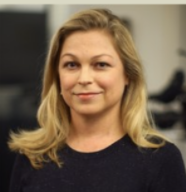Kate McCure, FPA London
“There is no substitute for being able to meet people in the flesh, to look them in the eye, and film or interview them face-to-face”
By Luciana Gurgel | MediaTalks, London
President of the Foreign Press Association of London, the world’s oldest press association, Kate McCure works as a London-based freelance producer for international TV, Radio & online. She spent twenty years at the Australian Broadcasting Corporation, Australia’s national public broadcaster, working in Australia and subsequently the UK.
She shared with MediaTalks views on the current situation of foreign media professionals working in the UK and advices to journalists who had to leave newsrooms and work from home from a news correspondent perspective.
How has Covid-19 pandemic affected foreign correspondents?
Who suffered the most from the crisis?
The work situation has been hard for many media workers posted here to the UK, mostly these are industrywide changes that have been taking place over many years, but it has all certainly been exacerbated by Covid-19. Newspapers have been cutting their reporting staff globally as their advertising streams dry up in the switch to social media. Freelance TV crews have had their rates squeezed by competition from new entrants to the market who are kitted out very inexpensively with prosumer equipment at a fraction of the cost of professional gear. I don’t know of any particular stories of people being sent back home from their postings to the UK. For some countries such as my own, Australia, going home was an impossibility due to travel bans as well as quarantines.
How concerned are foreign correspondentes about catching the virus during their work? Are they being careful?
I don’t think that illness or death was any more or less of a concern for correspondents than for the general population. Journalists tend to be reasonably well-informed about the risks and take sensible precautions without going over the top.
What changes have you noticed in the way correspondents work?
It has probably been easier for journalists to switch to working from home then for most other professionals. I think we are all aware of how lucky we are to have portable working lives that can be done from a laptop anywhere, although homes in Britain tend to be quite small, and having a spare room to use as a home office is a rare luxury for most people. I think we all have an increased awareness of those who do not have that choice: the key workers of the UK, the bus drivers and supermarket workers as well as the NHS staff who have put themselves and their lives on the front line in a way that we as journalists do not have to.
Any advice as a correspondent for colleagues that are now experiencing WFH?
Get used to it. Working from home is probably not going to go away any time soon, employers love it as they’ve effectively outsourced having to pay for an office for you to work in. There are benefits to not having to commute, but also downsides, especially the isolation. If you are the sort of person who enjoys the social interaction of an office, try and build that into your WFH life; work from a local cafe or pub once in a while, set up meetings in parks or restaurants where possible, instead of doing everything on Zoom. Get to know your neighbourhood and your neighbours and use them more for your social life.
How will working remotely will affect journalism?
I feel that young people entering the workforce and in the first decades of their working life are particularly disadvantaged, as they aren’t going to get the same benefits of working alongside and learning from their more experienced peers. That’s something that my generation took for granted, and we need to find ways to support our younger colleagues and ensure that their career development is taken in hand, and that they aren’t isolated.
Have you noticed threats to press freedom?
Britain is still a very free and fair society, however this is never to be taken for granted. The FPA has worked to liaise with the newly-established National Committee for the Safety of Journalists, to ensure that foreign journalists working in the UK are given fair and equitable access to government channels, and not treated as second-class citizens in a media environment that can sometimes be seen as a bit of an Old Boy’s club.
Are there lessons learned from your perspective as a foreign correspondent?
My motto has always been ‘nothing propinks like propinquity’ – it’s a made-up phrase, but it means that there is no substitute for being physically near to the person or thing that you’re focused on. I think we have all adapted remarkably well to homeworking, but it is no substitute for being able to meet people in the flesh, to look them in the eye, and film or interview them face-to-face. I really hope that we are able to get back to that before too long. We know this disease can kill, but we cannot shut down society entirely for the sake of safety, otherwise there’s no point in it all.
Luciana Gurgel is a Brazilian journalist based in London. She begun her editorial career at O Globo, one of the leading Brazilian media organisations. Later she founded (along with Aldo de Luca) Publicom, a successful corporate communications agency, acquired in 2016 by Golin + Weber Shandwick (IPG Group). In London, she has been working as news correspondent for Brazilian media – MyNews Channel, J&Cia – to which she writes a weekly column on trends and issue related to the news industry. The column originated a separate platform, MediaTalks, headed by Luciana from London as Editor-in-Chief.

